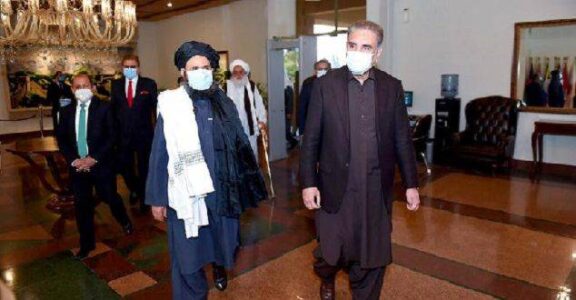
Taliban deputy leader arrived in Afghanistan from Qatar
The Taliban’s deputy leader and co-founder Mullah Abdul Ghani Baradar arrived in Kandahar on Tuesday after 20 years of exile, landing in the insurgent group’s former capital just days after they took control of the country.
A Taliban spokesman said on Twitter that Baradar and a high level delegation ‘reached their beloved country in the afternoon’ from Qatar.
His arrival came as the Taliban held a press conference in which the group said they ‘want to live peacefully’ after taking control of Afghanistan in a lighting conquest in little over a week, leading to human rights concerns for the people in the country.
‘There is a huge difference between us and the Taliban of 20 years ago, this has been an evolutionary process for us,’ the Taliban’s spokesperson claimed in the press conference on Tuesday.
‘We are going to decide what kind of laws will be presented to the nation. This will be the responsibility of the government with the participation of all people.’
Zabihullah Mujahid confirmed the Taliban’s intention to form a government, and made assurance that its shape will be announced once it has been completed.
‘Afghanistan will have a strong Islamic government,’ he said. ‘What the name and makeup will be, let’s leave that to political leaders. I can assure you it will have strong Islamic values.’
When asked by a reporter whether the Taliban would renounce terrorist group Al-Qaeda, Mujahid answered evasively, saying the group would not permit foreign fighters to use Afghanistan ‘against anybody’.
‘I would like to assure the international community that nobody will be harmed,’ Mujahid said from the former government’s media information centre in Kabul, speaking into a row of microphones.
‘We do not want to have any problems with the international community,’ he added, before defending the Taliban’s right to ‘act according to our religious principles.’
‘Other countries have different approaches, rules and regulations… the Afghans have the right to have their own rules and regulations in accordance with our values.’
Amid fears that women in Afghanistan will be the ones to suffer most under the Taliban’s rule after they were denied work, education among many other freedoms during the group’s reign from 1996 to 2001, Mujahid tried to ease such concerns, while still saying women would live under Sharia law.
‘[We] are committed to the rights of women under the system of sharia,’ Mujahid said. ‘They are going to be working shoulder to shoulder with us. We would like to assure the international community that there will be no discrimination.’
The spokesman suggested that the Taliban intended to put the last 20 years behind them, claiming that the group is ‘not going to revenge anybody, we do not have grudges against anybody’.
‘We want to make sure Afghanistan is not the battlefield of conflict anymore. We want to grant amnesty to those who have fought against us,’ he said.
He described the Taliban’s ’20 year struggle for freedom, emancipating the country form occupation,’ and said of the recent incursion: ‘This was our right, we have achieved our right, I would like to thank God for bringing us to this stage.’
There have also been concerns that the Taliban would restrict media and journalists within the country. Mujahid also attempted to allay those fears in Tuesdays conference.
‘I would like to assure the media that we are committed to the media within our cultural frameworks’, Mujahid said. ‘Private media can continue to be free and independent.
‘Islam is very important in our country… Therefore Islamic values should be taken into account when it comes to the media, to developing your programmes.
‘Impartiality of the media is very important, they can critique our work so that we can improve. But the media should not work against us’, he added.
Mujahid put particular emphasis on people being safe under the new Taliban regime, and that thing would be different from over two decades ago.
‘In your homes, nobody is going to harm you, nobody is going to be interrogated or chased, those who have knocked on doors to inspect houses are abusers, they are going to be pursued and investigated,’ he said.
‘Thousands of soldiers who fought us for 20 years, after the end of occupation, they have been pardoned. Those who are at the airport waiting, when they come back to their homes, they will be safe… we want to give them confidence.’
The Taliban’s spokesman said that the group has pardoned everybody for the stability and peace of Afghanistan,’ and said any harm caused in the recent incursion was ‘one of the side effects of conflict’.
‘A huge occupying force was defeated, it was impossible for us to emancipate the country, without injuries, without harms, without hurts.’
Baradar, reported to have been one of Mullah Omar’s most trusted commanders, was captured in 2010 by security forces in the southern Pakistani city of Karachi and released in 2018.
Just nine months ago, Baradar posed for pictures with Donald Trump’s Secretary of State Mike Pompeo to sign a peace deal in Doha which today lies in tatters.
On Sunday, his forces seized Kabul and he is now tipped to become Afghanistan’s next leader in a reversal of fortune which humiliates Washington.
While Haibatullah Akhundzada is the Taliban’s overall leader, Baradar is head of its political office and one of the most recognisable faces of the chiefs who have been involved in peace talks in Qatar.
The 53-year-old was deputy leader under ex-chief Mullah Mohammed Omar, whose support for Al-Qaeda leader Osama bin Laden led to the US-led invasion of Afghanistan after 9/11.
The Taliban’s former chief Mullah Mohammed Omar founded of the Islamic Emirate of Afghanistan in 1996 with Baradar. Omar’s death was announced in 2015 – two years after he succumbed to TB.
Mullah Omar bestowed the title ‘brother’ upon Baradar as a sign of affection.
Source: MSN





